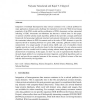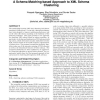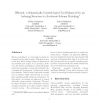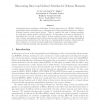168
click to vote
JBCS
2010
14 years 9 months ago
2010
Schema matching is a fundamental issue to many database applications, such as query mediation and data warehousing. It becomes a challenge when different vocabularies are used to r...
128
click to vote
SIGMOD
2008
ACM
15 years 2 months ago
2008
ACM
The UQBE is a mashup tool for non-programmers that supports query-by-example (QBE) over a schema made up by the user without knowing the schema of the original sources. Based on a...
152
click to vote
DKE
2007
15 years 2 months ago
2007
Integration of multiple heterogeneous data sources continues to be a critical problem for many application domains and a challenge for researchers world-wide. With the increasing ...
103
click to vote
CIDR
2009
15 years 3 months ago
2009
To date, the principal use case for schema matching research has been as a precursor for code generation, i.e., constructing mappings between schema elements with the end goal of ...
120
click to vote
IIWAS
2008
15 years 3 months ago
2008
The relationship between XML data clustering and schema matching is bidirectional. On one side, clustering techniques have been adopted to improve matching performance, and on the...
124
click to vote
BIS
2008
15 years 3 months ago
2008
The deep Web has many challenges to be solved. Among them is schema matching. In this paper, we build a conceptual connection between the schema matching problem SMP and the fuzzy ...
125
click to vote
BDA
2007
15 years 3 months ago
2007
Schema matching is a crucial task to gather information of the same domain. This is more true on the web, where a large number of data sources are available and require to be matc...
117
click to vote
DOCENG
2005
ACM
15 years 4 months ago
2005
ACM
Structured document content reuse is the problem of restructuring and translating data structured under a source schema into an instance of a target schema. A notion closely tied ...
122
click to vote
DASFAA
2003
IEEE
15 years 7 months ago
2003
IEEE
Automating schema matching is challenging. Previous approaches (e.g. [MBR01, DDH01]) to automating schema matching focus on computing direct element matches between two schemas. S...
132
click to vote
VLDB
2004
ACM
15 years 7 months ago
2004
ACM
In a Web database that dynamically provides information in response to user queries, two distinct schemas, interface schema (the schema users can query) and result schema (the sch...




